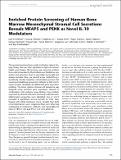| dc.contributor.author | Elman, Jessica S | |
| dc.contributor.author | Shen, Keyue | |
| dc.contributor.author | Gabow, Aaron | |
| dc.contributor.author | Yarmush, Joshua | |
| dc.contributor.author | Jiao, Yunxin | |
| dc.contributor.author | Fletcher, Anne | |
| dc.contributor.author | Lee, Jungwoo | |
| dc.contributor.author | Yarmush, Martin L | |
| dc.contributor.author | Parekkadan, Biju | |
| dc.contributor.author | Li, Matthew | |
| dc.contributor.author | Manrai, Arjun Kumar | |
| dc.contributor.author | Milwid, Jack | |
| dc.contributor.author | Cima, Michael J. | |
| dc.date.accessioned | 2017-10-05T17:15:39Z | |
| dc.date.available | 2017-10-05T17:15:39Z | |
| dc.date.issued | 2016-12 | |
| dc.date.submitted | 2013-07 | |
| dc.identifier.issn | 1525-0016 | |
| dc.identifier.issn | 1525-0024 | |
| dc.identifier.uri | http://hdl.handle.net/1721.1/111793 | |
| dc.description.abstract | The secreted proteins from a cell constitute a natural biologic library that can offer significant insight into human health and disease. Discovering new secreted proteins from cells is bounded by the limitations of traditional separation and detection tools to physically fractionate and analyze samples. Here, we present a new method to systematically identify bioactive cell-secreted proteins that circumvent traditional proteomic methods by first enriching for protein candidates by differential gene expression profiling. The bone marrow stromal cell secretome was analyzed using enriched gene expression datasets in combination with potency assay testing. Four proteins expressed by stromal cells with previously unknown anti-inflammatory properties were identified, two of which provided a significant survival benefit to mice challenged with lethal endotoxic shock. Greater than 85% of secreted factors were recaptured that were otherwise undetected by proteomic methods, and remarkable hit rates of 18% in vitro and 9% in vivo were achieved. © 2014 The American Society of Gene and Cell Therapy. | en_US |
| dc.description.sponsorship | National Human Genome Research Institute (U.S.) (Grant T32 HG002295) | en_US |
| dc.publisher | Elsevier BV | en_US |
| dc.relation.isversionof | http://dx.doi.org/10.1038/MT.2014.17 | en_US |
| dc.rights | Creative Commons Attribution-NonCommercial-NoDerivs License | en_US |
| dc.rights.uri | http://creativecommons.org/licenses/by-nc-nd/4.0/ | en_US |
| dc.source | Elsevier | en_US |
| dc.title | Enriched Protein Screening of Human Bone Marrow Mesenchymal Stromal Cell Secretions Reveals MFAP5 and PENK as Novel IL-10 Modulators | en_US |
| dc.type | Article | en_US |
| dc.identifier.citation | Milwid, Jack M et al. “Enriched Protein Screening of Human Bone Marrow Mesenchymal Stromal Cell Secretions Reveals MFAP5 and PENK as Novel IL-10 Modulators.” Molecular Therapy 22, 5 (May 2014): 999–1007 © The American Society of Gene & Cell Therapy | en_US |
| dc.contributor.department | Harvard University--MIT Division of Health Sciences and Technology | en_US |
| dc.contributor.department | Massachusetts Institute of Technology. Department of Materials Science and Engineering | en_US |
| dc.contributor.department | Koch Institute for Integrative Cancer Research at MIT | en_US |
| dc.contributor.mitauthor | Milwid, Jack Miles | |
| dc.contributor.mitauthor | Li, Matthew | |
| dc.contributor.mitauthor | Manrai, Arjun Kumar | |
| dc.contributor.mitauthor | Cima, Michael J | |
| dc.relation.journal | Molecular Therapy | en_US |
| dc.eprint.version | Final published version | en_US |
| dc.type.uri | http://purl.org/eprint/type/JournalArticle | en_US |
| eprint.status | http://purl.org/eprint/status/PeerReviewed | en_US |
| dc.date.updated | 2017-10-05T13:03:04Z | |
| dspace.orderedauthors | Milwid, Jack M; Elman, Jessica S; Li, Matthew; Shen, Keyue; Manrai, Arjun; Gabow, Aaron; Yarmush, Joshua; Jiao, Yunxin; Fletcher, Anne; Lee, Jungwoo; Cima, Michael J; Yarmush, Martin L; Parekkadan, Biju | en_US |
| dspace.embargo.terms | N | en_US |
| dc.identifier.orcid | https://orcid.org/0000-0001-9296-2220 | |
| dc.identifier.orcid | https://orcid.org/0000-0003-2379-6139 | |
| mit.license | PUBLISHER_CC | en_US |
| mit.metadata.status | Complete | |
